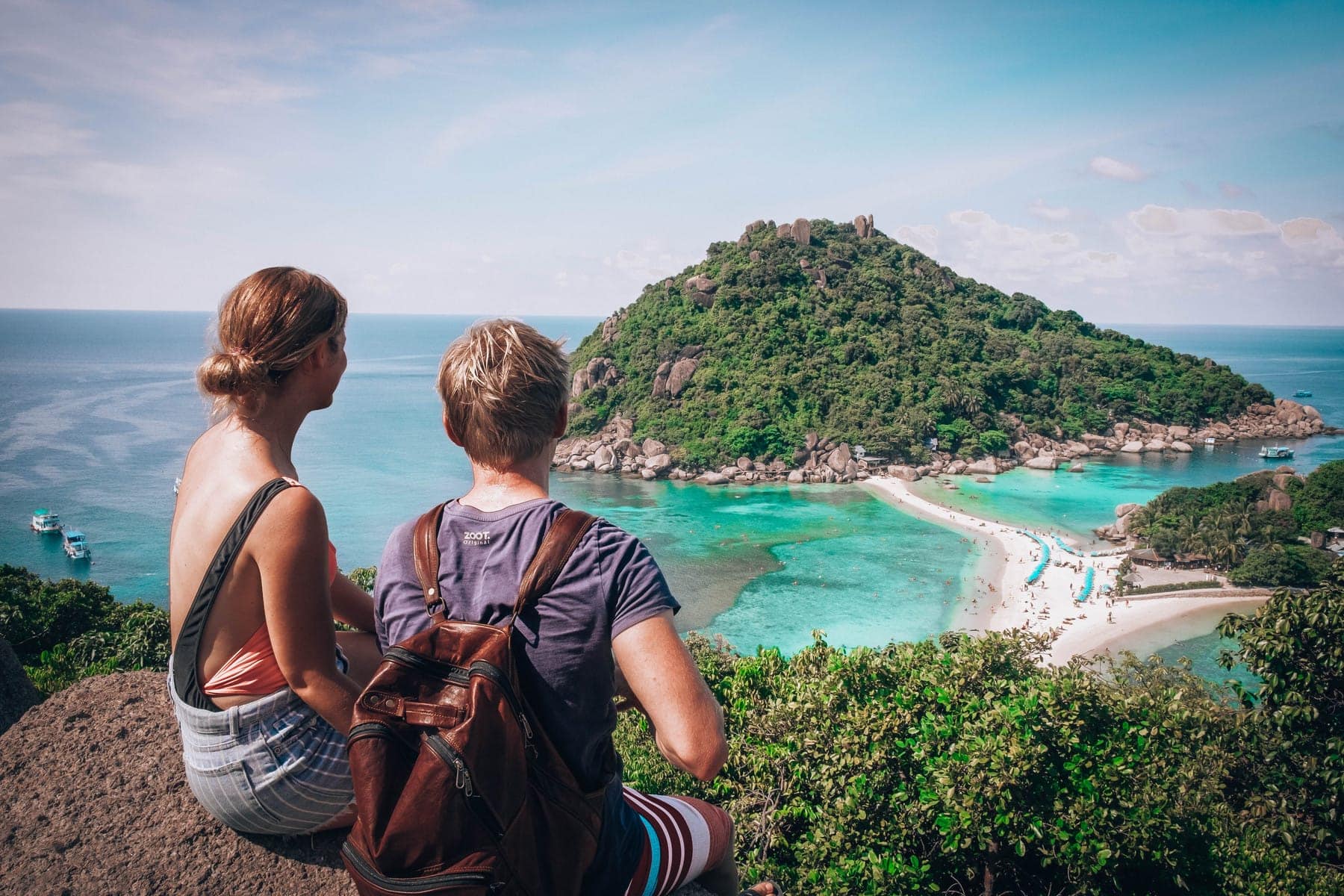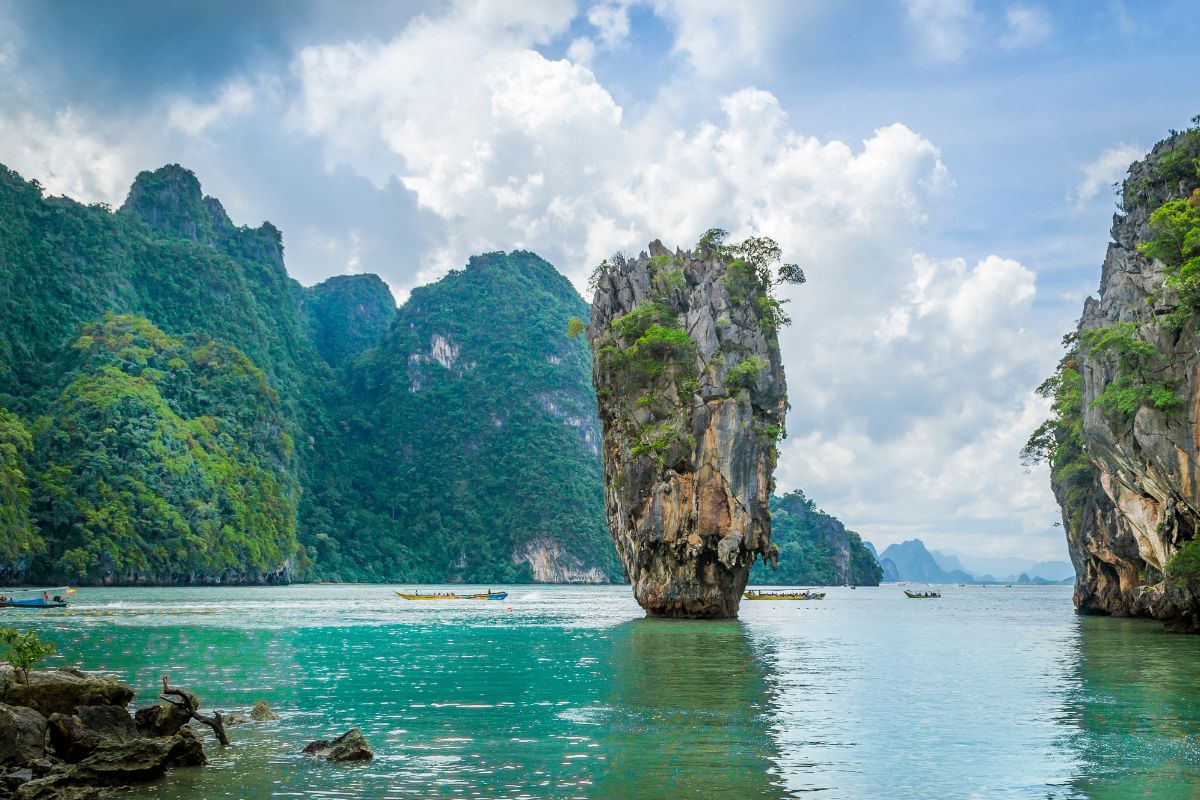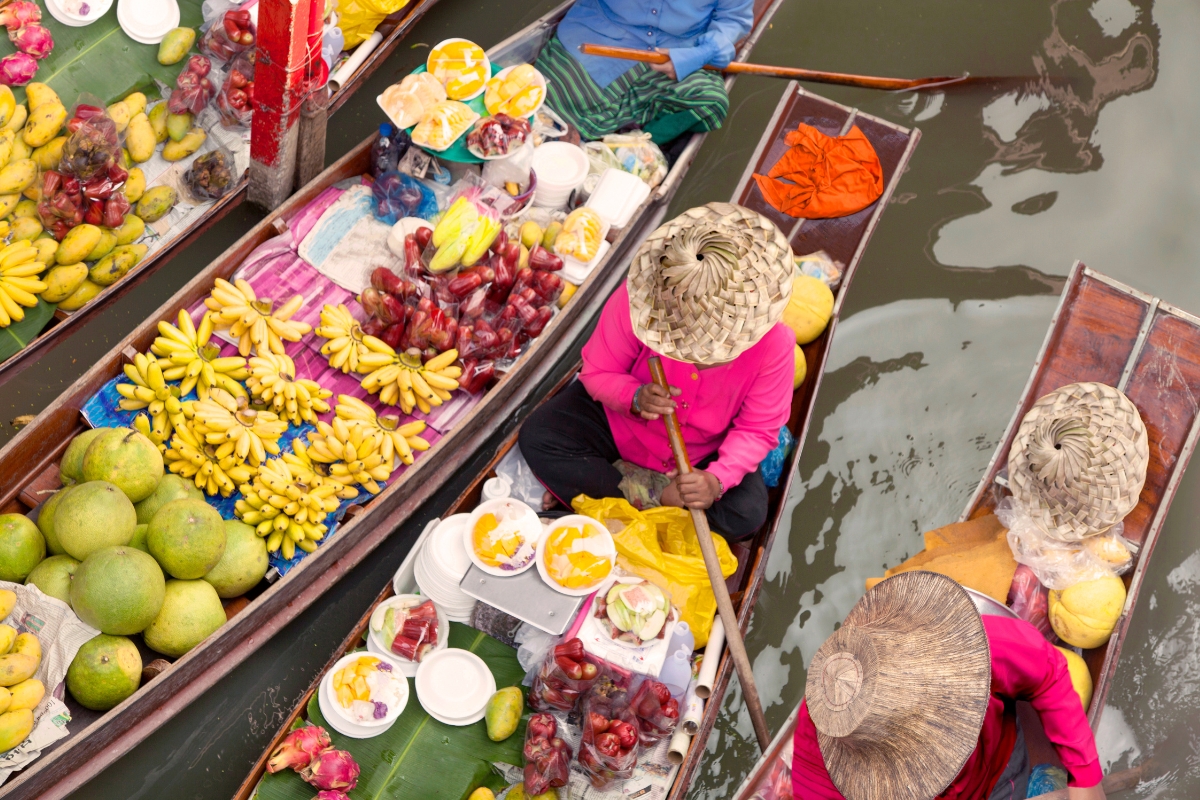Dreaming of an unforgettable exotic holiday, but finding travel agencies too restrictive or overpriced? Plan your independent trip to Thailand. Thailand is known as the Land of Smiles, and there’s truly nothing to fear. In this guide — Thailand: 11 Best Places for Your Holiday — I’ll advise you not only on how to plan the perfect holiday but also how to get cheap mobile internet in Thailand and how to withdraw from ATMs without unnecessary fees. I’ll reveal where we look for hotels and how we handle insurance.
Why Travel Independently to Thailand – our Experience
A few years ago, when Lukáš and I were deciding where to go for a winter holiday, cheap flights to Bangkok popped up. I think we bought them mainly for the food back then. We love Thai cuisine. We didn’t want to stay in just one place, so we planned a few days in Bangkok and then headed to Koh Samui island, where, by the way, the second season of the White Lotus series was filmed. And you know what? It was absolutely fantastic, and we managed it completely without any problems!
If you speak at least a little English, you don’t have to worry about traveling independently in Thailand at all. You just need to prepare a little and follow a few basic rules. Here are 11 tips on how to enjoy Thailand to the fullest – independently and stress-free.

TL;DR
- Length of Stay: Given the travel time, I recommend at least 2 weeks
- Best Time to Visit: November to February (cooler, dry season)
- Accommodation: Search on booking.com and check reviews
- Visa: Not required for tourists staying up to 60 days, only registration in the TDAC system
- Budget: From cheap hostel accommodation for a few hundred CZK to luxury hotels up to 3,000 CZK/night
- Transport: Combination of planes, trains, buses, and rented scooters
- Mobile Internet: Get an e-sim with unlimited data from Airalo.
Independent Travel to Thailand: What to Know before You Go
If you’re planning an independent trip to Thailand, it’s important to know some basic information that will make planning easier.
Do I Need a Visa?
You do not need a visa for tourist trips to Thailand. You only need to register in the online TDAC system (Thailand Digital Arrival Card) at least three days before arrival. You will fill in personal details, travel information, and your accommodation address in Thailand. Upon arrival, you will receive a stamp in your passport that allows you to stay for up to 60 days.
For entry, you need:
- Passport valid for at least 6 months from entry
- Proof of funds upon request (20,000 THB – 13,000 CZK per person or 40,000 THB – 260,000 CZK per family)
What Vaccinations Do You Need for Thailand?
Recommended vaccinations include typhoid, hepatitis A, hepatitis B, tetanus, and currently also protection against Dengue fever. Although many travelers go without vaccinations, especially on first trips to Southeast Asia, I definitely wouldn’t risk it.
Money and Payments
The currency is the Thai Baht (THB), where 1 THB is approximately 0.65 CZK. You typically cannot buy this currency in the Czech Republic; the easiest way is to withdraw cash at the airport from an ATM or at exchange offices. How to withdraw money without fees will be explained below.
In larger cities and tourist areas, you can usually pay by card, but in rural areas, traditional markets, and smaller businesses, you will need cash.

Thailand: 11 Best Places for Your Holiday
Let’s now look at everything you should know if you’re planning an independent holiday in Thailand.
When to Go to Thailand
People mainly fly to Thailand in winter – from November to February – during which time you can expect dry and relatively cooler weather (which in Thai conditions still means 25-32 °C). March to June is unbearably hot, while from July to October you’ll experience monsoon rains and extreme humidity.
Remember that during peak season (December to February), prices are higher and tourist spots are more crowded. That’s why we went in November, but it rained for a few days (which didn’t bother us, as we were in Thailand for a month).
How to get Cheap Mobile Data in Thailand
If you’re traveling independently to Thailand, you should definitely have unlimited mobile data. It’s not just about wanting to scroll Instagram and text your family and friends, but mainly, if a problem arises, you’ll have a way to find a solution, whether your train leaves without you or you quickly need new accommodation. And of course, when traveling independently, you constantly need Google Maps.
How to get internet on your phone? Definitely not from a Czech operator; that would cost you a fortune. You can either buy a classic SIM card from local operators (dtac, AIS, or True Move) directly at the airport or at any 7-Eleven for about 300 Baht (approx. 200 CZK), which will give you around 15 GB of data for a week.
For me, it’s better to get an eSIM before departure – for example, from Airalo for under $20 you get unlimited data for 15 days, including a Thai phone number, which can be useful when ordering taxis via Grab or booking tours.

How Long should You Travel to Thailand?
“Let’s go to Thailand for a week!” – a sentence we most often hear from tourists who have never been to Southeast Asia before. Seriously? You’ll spend 20 hours traveling there and back just to have five days to explore a country that offers an endless array of experiences?
We recommend at least two weeks, ideally three. Thailand is huge, and transfers between different places take time. Even we didn’t manage to see as much as we planned on our first trip – and we were there for a whole month!
When planning, keep in mind that you don’t have to (and can’t) see everything. This time, we chose a combination of city hustle in Bangkok (3 days) followed by beach relaxation on Koh Samui (30 days). However, today I would do it differently and either go to more islands or head north to the mountains.
For your first visit to Thailand, I recommend one of these combinations:
- Bangkok + Southern Islands (Phuket, Koh Samui, Koh Phi Phi)
- Bangkok + Northern Mountains (Chiang Mai, Chiang Rai, Pai)
Don’t try to cram both the north and south into one trip unless you have at least a month. Distances are vast, and transfers will cost you a lot of time and energy.
How to Withdraw Money in Thailand
This is a tip I probably don’t need to write, as every experienced traveler knows it, but just in case – get Revolut! If you still pay with a regular card abroad or even exchange money at brick-and-mortar exchange offices, you’re losing a lot of money.
A Revolut card combined with the app allows you to convert money into foreign currencies at the interbank exchange rate (meaning no fees or hidden margins that regular banks charge). You can also withdraw cash from ATMs abroad with minimal or zero fees (up to a certain limit depending on your account type).
In practice, it works like this: you upload Czech Korunas to your Revolut account and then, in the app, convert them to Thai Baht in seconds. Subsequently, you pay with the card as usual, but without unnecessary conversion fees. Every day, you’ll save tens to hundreds of Korunas compared to regular bank cards.
Just a small tip – exchange Baht on weekdays. On weekends, Revolut charges a small exchange fee (0.5-1%) because international financial markets are closed.

Travel Insurance – Something You should Never Underestimate!
This isn’t a tip, but an absolute necessity – get proper travel insurance! And I don’t mean a basic package that actually covers nothing.
For years, we traveled with basic insurance until our friend had an accident in Thailand that almost cost him his life. While riding a scooter in Thailand, he crashed, suffered serious injuries, and had to be airlifted to the hospital. Do you know how much such transport and subsequent hospitalization cost? Hundreds of thousands!
For your trip to Thailand, definitely get insurance with sufficiently high limits – at least 5 million CZK for medical expenses. Also, verify that the insurance covers the activities you plan to do (diving, scooter riding, etc.). An excellent choice is ERV insurance, which offers quality coverage from 44 CZK per day, or for long-term travelers, we recommend SafetyWing or TrueTraveller.
And one more thing – in case of an accident, immediately contact your insurance company’s assistance service. They will advise you on how to proceed and often communicate directly with the hospital regarding payments.
Flights and Local Transport
If you want to snag cheap flights, you’ll need to buy them several months in advance and monitor offers. We flew to Thailand for 15,000 CZK, and that was even with a large suitcase. They can be found for more or less, but you have to track cheap flights, not have a fixed date, and most importantly, be flexible with the idea that you might not fly from Prague but from Budapest (like us).
For traveling around Thailand, you have several options:
- Plane: Ideal for longer distances. Domestic flights are operated by companies such as AirAsia, Nok Air, Thai Lion Air, or Bangkok Airways. Prices start at a few hundred Korunas.
- Train: This was the option we chose. We traveled to the south of Thailand
- Bus: A cheap option, but comfort varies. VIP buses are quite comfortable; regular line buses are more for adventurers.
- Scooter: Ideal for local transfers, but be careful! Thai roads are dangerous, and without a driver’s license, you risk not only a fine but also that your insurance company won’t cover any potential damages.
How to Choose Accommodation
Thailand offers accommodation for every budget – from cheap hostels for a few hundred CZK to luxury resorts for thousands of Korunas per night. In Bangkok, we stayed in a hostel for a few hundred CZK per night, but on Koh Samui, we already booked a beach bungalow.
We usually look for accommodation via Booking.com, but in Asia, you can also try Agoda.com. I recommend reading reviews carefully.

Food in Thailand
I won’t lie – we actually went to Thailand for the food! And it was worth it. Forget the Europeanized Thai restaurants back home; this is a completely different league.
The best food can be found on the street. Food stalls are everywhere and offer freshly prepared delicacies at ridiculously low prices. For 60-100 CZK, you can eat until you’re full, even in tourist areas. In Bangkok, definitely visit Chinatown, which comes alive in the evening with hundreds of food stalls.
What to Definitely Try:
- Pad Thai – fried noodles with egg, tofu or meat, and peanuts
- Tom Yum – spicy sour soup with shrimp
- Som Tam – spicy papaya salad
- Massaman Curry – milder curry with potatoes and peanuts
- Mango Sticky Rice – sweet sticky rice with fresh mango, a perfect dessert
Don’t be afraid of street food, but choose stalls where locals eat. And if you don’t like spicy food, learn the phrase “mai phet” (not spicy) – it will save your life!
What to Pack and What not to Forget
Packing for a trip to Thailand is simple – you’ll need less than you think. Clothes dry quickly, and if needed, you can cheaply wash or buy anything.
Don’t forget:
- Sunscreen (it’s expensive in Thailand)
- Mosquito repellent
- Basic medications (for diarrhea, pain relief, plasters)
- Power adapter (in Thailand, they use the same as in the Czech Republic, but some hotels have British or American sockets)
- Comfortable walking shoes
- Swimwear and snorkeling gear (if you plan sea trips)
- Light scarf or shawl for women – useful when visiting temples
What not to bring:
- Towels (most accommodations provide them)
- Heavy shoes (sandals and one pair of light sneakers are enough)
- Too formal clothing (unless you plan to visit luxury restaurants)

Cultural Specifics You should Know
Thais are incredibly kind and hospitable people, but they have their cultural specifics that are good to respect:
- The Royal Family is sacred – never speak disrespectfully about them. There are portraits of the King in public places, and it is not appropriate to react to them improperly.
- The head is sacred, the feet are unclean – never pat anyone on the head (not even children) and do not point at anyone with the soles of your shoes.
- Take off your shoes when entering temples and sometimes homes – notice if there are other people’s shoes at the entrance.
- Dress appropriately for temples – you must have your shoulders and knees covered.
- Street vendors are part of the culture – bargaining is common, but you shouldn’t be aggressive. This is quite different from Africa. Here, you bargain with a smile.
Safety in Thailand, or how to Avoid Problems
Thailand is generally a safe country, but as everywhere in the world, it’s good to follow basic rules:
- Watch your belongings in tourist areas.
- Be extremely careful when renting a scooter – traffic in Thailand is crazy.
- Drink bottled water – tap water is not drinkable.
- Respect local customs and traditions – Thailand has a different religion and different cultural customs, don’t be rude.
- Avoid drugs – despite the recent legalization of marijuana, other drugs are still strictly prohibited in Thailand, and penalties are extremely high.
- Keep a copy of your passport and insurance – ideally both physical and digital, stored in the cloud.
FAQ
Is Thailand Safe?
Thailand is among the safest destinations in Southeast Asia. As everywhere, it’s good to use common sense and watch your belongings.
How Much Money Should You Bring to Thailand?
I recommend having at least 1,000-2,500 CZK per day.
Does Everyone Speak English in Thailand?
Yes, in most places, you can communicate comfortably in English.
Tips and Tricks for Your Vacation
Don’t Overpay for Flights
Search for flights on Kayak. It’s our favorite search engine because it scans the websites of all airlines and always finds the cheapest connection.
Book Your Accommodation Smartly
The best experiences we’ve had when looking for accommodation (from Alaska to Morocco) are with Booking.com, where hotels, apartments, and entire houses are usually the cheapest and most widely available.
Don’t Forget Travel Insurance
Good travel insurance will protect you against illness, accidents, theft, or flight cancellations. We’ve had a few hospital visits abroad, so we know how important it is to have proper insurance arranged.
Where we insure ourselves: SafetyWing (best for everyone) and TrueTraveller (for extra-long trips).
Why don’t we recommend any Czech insurance company? Because they have too many restrictions. They set limits on the number of days abroad, travel insurance via a credit card often requires you to pay medical expenses only with that card, and they frequently limit the number of returns to the Czech Republic.
Find the Best Experiences
Get Your Guide is a huge online marketplace where you can book guided walks, trips, skip-the-line tickets, tours, and much more. We always find some extra fun there!
